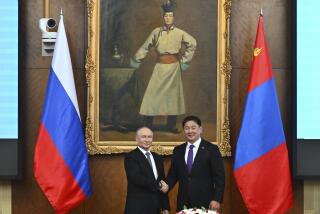Political corruption case illustrates Mongolia’s challenges
- Share via
ULAN BATOR, Mongolia — The man who was once the most powerful person in Mongolia lies in a hospital bed recovering from a hunger strike, the late afternoon sun falling across his sunken face.
Mongolia’s parliamentary elections are scheduled Thursday, but former President Nambaryn Enkhbayar will not be on the ballot. He is being tried on five counts of corruption, a case he charges was engineered by the current president.
“The present authorities are scared of me,” he said in fluent English, his voice grave. “They control the judicial system and media. That’s why they could launch this so-called anti-Enkhbayar campaign.”
Enkhbayar’s case, the most serious corruption scandal in Mongolia’s recent history, illustrates some of the country’s challenges as it seeks to establish itself as an example for other Central Asian nations. Its economy is growing rapidly as a result of a mining boom. But rampant corruption, political infighting and a still-incipient judicial system could hold it back.
Among other charges, Enkhbayar, who left office in 2009, is accused of pilfering $113,000 worth of television equipment intended for a Japanese Buddhist monastery. According to a separate charge, he allegedly dodged customs tariffs while shipping eight volumes of his autobiography to South Korea.
Amnesty International released a statement in May saying that his detention “appears to be arbitrary.”
Sumati Luvsandendev, the director of Sant Maral, a polling organization in Ulan Bator, the capital, said that if new members of parliament did not address the country’s most pressing issues — polluted rivers, extreme poverty, the rise of an oligarchic class — Enkhbayar’s image as a victim could help him gather enough support to eventually regain power.
“He’s a protest leader in this country,” Sumati said, “which means that he definitely has public support, and it’s not small.”
If Enkhbayar’s Mongolian People’s Revolutionary Party wins enough seats in parliament, he could challenge his rival, current President Tsakhiagiin Elbegdorj, next year. Polls indicate that support for Enkhbayar’s party has doubled since April.
Enkhbayar’s arrest April 13 was broadcast live on national television. Hundreds of policemen surrounded the former president’s house, carried him outside and threw him into the back of a van.
Enkhbayar’s wife told Mongolian media that police made him walk alongside naked inmates and threatened to harm his 10-year-old daughter.
To protest the conditions of his detention, he refused to eat for 10 days. In mid-May, his family told media outlets that he had begun to suffer from organ failure. Because of his failing health and international pressure, authorities released him on bail.
Enkhbayar and his lawyers argue that the court gave them only a week to review the prosecution’s evidence against him — 49 binders containing 150 documents each. They say that barring Enkhbayar from the elections before the court reaches a verdict violates his constitutional rights.
In a statement June 8, President Elbegdorj urged the international community to wait until the accusations were laid out in court before reaching a conclusion.
Although Enkhbayar’s hunger strike initially elicited public sympathy, his support waned when a Mongolian television station broadcast images of him living in a five-room detention chamber and acting belligerently toward the hospital staff.
Few Mongolians doubt that political corruption is a serious issue. Critics of Enkhbayar say his case will send a message to other politicians that nobody is above the law.
“We don’t want to set an example that if somebody’s corrupt that they can get away with it,” said Oyungerel Tsedevdamba, a candidate for parliament and former human rights advisor to Elbegdorj.
Others said the Enkhbayar case showed an increased reliance on the courts for matters that previously may have been resolved through violence. In 1998, the leader of Mongolia’s democratic revolution, Sanjaasuren Zorig, was stabbed to death in front of his apartment. The killers were never found.
As Mongolians prepare to vote, many here are more concerned with unemployment or inflation. Even if they’ve been waiting for years for the government to make good on its promises, a number still express optimism.
“In Mongolia, they say that if you say negative things, they’ll all come true,” said Tserem Buted, 58, a retired seamstress. “Good things can come true, too. Maybe not for me, but at least for my children.”
Kaiman is a special correspondent.
More to Read
Sign up for Essential California
The most important California stories and recommendations in your inbox every morning.
You may occasionally receive promotional content from the Los Angeles Times.













